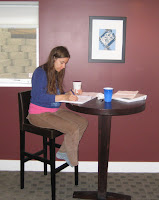1) Pick a place: When we began planning for our first retreat, we quickly decided to hold the retreat at a place and time that allowed the largest number of us to attend. We chose a location outside of Detroit in 2011--a beautiful, three story house on a man-made lake. Flights were relatively inexpensive, and the house offered plenty of room.
 | |
| The crew in 2011: Back - Amy Rose Capetta, Katie Bayerl, Rachel Wilson, Carol Allen, Sue LaNeve; Middie - Mary Winn Heider, Jennifer Schmidt; Front - Linden McNeilly, Ginger Johnson |
While we loved the 2011 house, we decided to try something a little different in 2012. We wanted to feel more secluded, so we picked a house on a large, wooded, two-acre lot. We also chose a house in Beverly Shores, IN, about an hour outside of Chicago. Chicago was a less-expensive hub city than Detroit, and since four our our crew lived in there, we didn't have to rent any cars.
 |
| Ginger and Rachel outside of the 2012 House (Beverly Shores, IN) |
 |
| "Can I get a hot tub?!" |
While the 2011 house offered more room and was a little cheaper, the 2012 house gave us the retreat feel that we were craving. We didn't feel like were where held up in the suburbs--we felt away.
(The 2012 house also had a huge outdoor hot tub, which is always a good thing.)
2) Make a schedule: I can't stress how important this is. While we wanted to have a lot of fun, we wanted to get meaningful work done. We also wanted to hold small workshops. It easy to say that you can fit all this in over a 4 day weekend, but you'd be surprised how quickly the time passes without a little structure.
 |
| Mary Winn, hard at work |
3) Think about ways to cut down expenses. Picking a large hub city certainly cut down on costs. We also cooked most of our meals. This not only cut down on cost, but it allowed us to hang out while working in the kitchen. All that being said--the bigger the kitchen, the easier it is to fix food. Our 2012 house had a much smaller kitchen that our previous house, making it that much harder for everyone to maneuver. We're already talking about contingency plans for the next retreat if we pick a house with a small kitchen. And be sure to bring a crock-pot or two.
 |
| Marianna, Katie and Mary Winn whipping up a meal. |
4) Share the responsibilities. We not only shared in cooking duties, but we also shared with clean-up, planning, driving--everything. This way, it didn't feel like one or two people were doing all the work.
5) Have Fun! Sure, you're there to work, but don't forget to have fun. And wine and chocolate always help.
 |
| Sara's clients on the beach - Amy Rose Capetta, Rachel Wilson, Varian Johnson, Marianna Baer |
Our 2011 retreat was extremely successful. Between 2011 and 2012, three retreat pieces sold--Amy Rose Capetta's Entangled, Rachel Wilson's Don't Touch, and my own Jackson Greene Steals the Election.
I can't wait to see the results of our 2012 retreat, and I can't wait until 2013!

